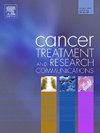The role of dietary sugars in cancer risk: A comprehensive review of current evidence
Q3 Medicine
引用次数: 0
Abstract
Goal of the review
The objective of this review is to conduct a thorough examination of the current evidence regarding the correlation between dietary sugar intake and cancer risk. This will encompass the biological mechanisms, the diverse effects of various sugar types, and the potential implications for cancer treatment and dietary recommendations.
Introduction
Nutritional and epidemiological studies now focus much on the relationship between sugar intake and cancer. The data is still conflicting even if some studies imply that excessive sugar intake can help cancer develop by means of insulin resistance and chronic inflammation.
Discussion
Through processes such as insulin resistance, inflammation, and angiogenesis, dietary sugars can impact carcinogenesis. Fructose increases angiogenesis by VEGF overexpression while glucose stimulates cancer cell growth by the Warburg effect. Contradicting data on the contribution of sugar to cancer emphasizes the need of consistent research techniques to simplify these dynamics. Reducing added sugar consumption in cancer prevention and management is especially crucial given that sugar affects immune function and treatment resistance, which could lead to new therapeutic targets.
Conclusion
High sugar intake is linked to mechanisms such as the Warburg effect, insulin resistance, and chronic inflammation, which may contribute to cancer risk under specific conditions. However, the evidence is not universally conclusive, and additional large-scale, long-term research are required to better understand these processes. To help in cancer prevention and management, public health guidelines should emphasize reducing added sugar consumption and promoting a balanced diet rich in natural foods.
求助全文
约1分钟内获得全文
求助全文
来源期刊

Cancer treatment and research communications
Medicine-Oncology
CiteScore
4.30
自引率
0.00%
发文量
148
审稿时长
56 days
期刊介绍:
Cancer Treatment and Research Communications is an international peer-reviewed publication dedicated to providing comprehensive basic, translational, and clinical oncology research. The journal is devoted to articles on detection, diagnosis, prevention, policy, and treatment of cancer and provides a global forum for the nurturing and development of future generations of oncology scientists. Cancer Treatment and Research Communications publishes comprehensive reviews and original studies describing various aspects of basic through clinical research of all tumor types. The journal also accepts clinical studies in oncology, with an emphasis on prospective early phase clinical trials. Specific areas of interest include basic, translational, and clinical research and mechanistic approaches; cancer biology; molecular carcinogenesis; genetics and genomics; stem cell and developmental biology; immunology; molecular and cellular oncology; systems biology; drug sensitivity and resistance; gene and antisense therapy; pathology, markers, and prognostic indicators; chemoprevention strategies; multimodality therapy; cancer policy; and integration of various approaches. Our mission is to be the premier source of relevant information through promoting excellence in research and facilitating the timely translation of that science to health care and clinical practice.
 求助内容:
求助内容: 应助结果提醒方式:
应助结果提醒方式:


